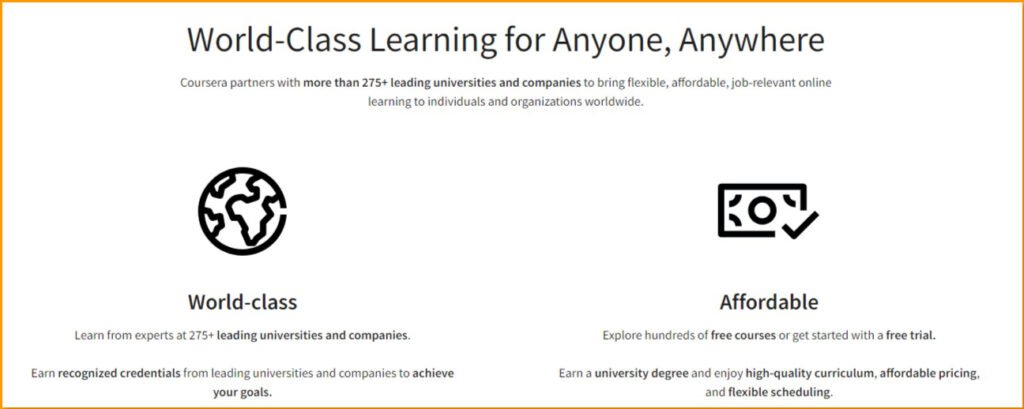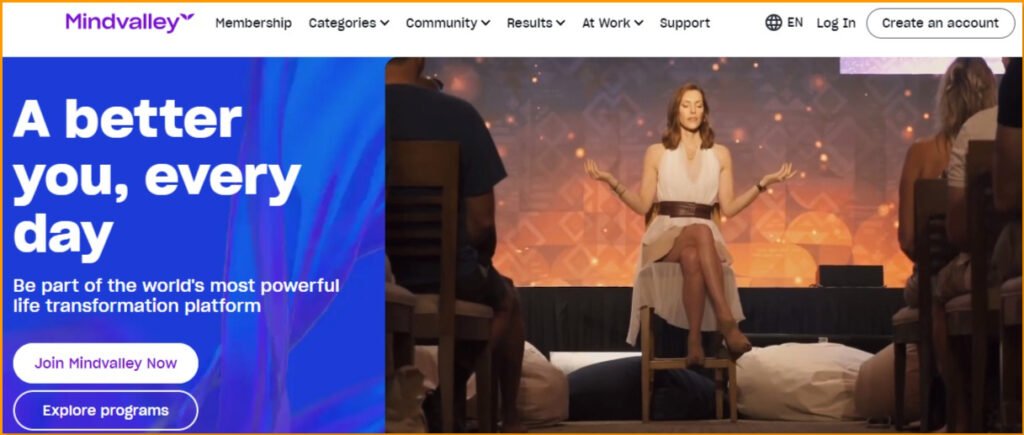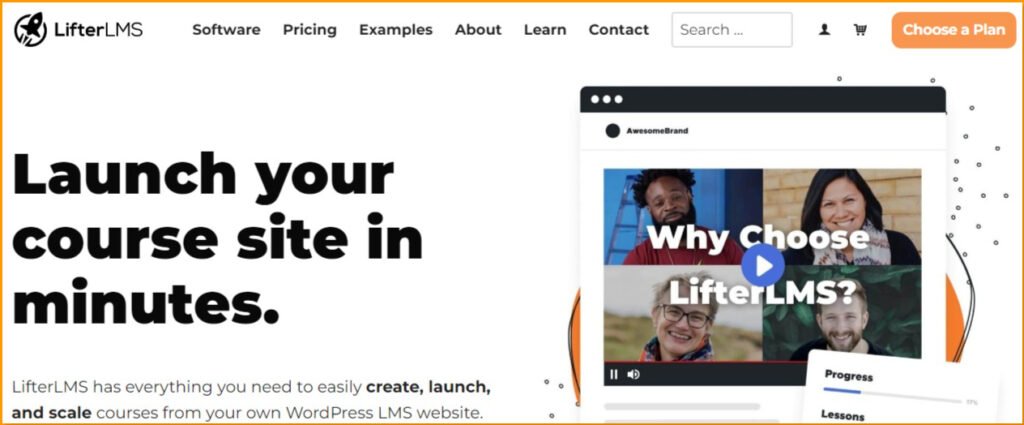Coursera Review 2024: Is It Worth the Hype? Pros and Cons
- Author: Eduklass
- Updated: March 14, 2024

Coursera stands as a leading name in online education, undoubtedly so.
As platforms grow, sometimes they lose sight of what made them excellent initially. Despite some drawbacks, Coursera maintains a solid reputation among the public.
Whether your aim is to learn a new skill, enhance job-related expertise, or excel in a hobby, Coursera offers an array of options to equip you for success.
This review of Coursera reminds us that isolated issues shouldn’t overshadow the platform’s overall value, considering the vast number of students it has served.
We’ll delve into pricing, their freemium plan, user-friendliness, and more.
What Is Coursera?
Coursera serves as an online course platform collaborating with leading universities.

Its offerings span from short courses, known as Massive Open Online Courses (MOOCs), to specialized topics and online degrees, providing a diverse selection.
The instructors on Coursera are esteemed faculty members from renowned universities, ensuring high-quality instruction.
Many well-known companies utilize Coursera for employee training, indicating the platform’s credibility in delivering job-relevant skills. All courses are accessible online, featuring videos, text materials, downloads, and quizzes to assess learning.
Navigating the Coursera Course Catalog
To begin your exploration of Coursera’s offerings, start with the course catalog. Here, you’ll find accredited certificates and degree programs from universities. Coursera categorizes its courses into five types:
- Courses: These include simple, auto, and peer-graded courses, and you receive a Coursera certificate upon completion.
- Specializations: Groups of courses designed to help you master career skills, often incorporating practical projects.
- Professional Certificates: Training programs focusing on job skills to gain experience or prepare for industry certification.
- MasterTrack Certificates: Courses that provide career credentials and contribute toward an online degree, often involving real-world projects.
- Degrees: Modular degree programs enable you to earn your degree remotely and at your own pace.
Each listing in the catalog is marked with a colored label indicating its type, making it easy to identify at a glance.
What Can You Study on Coursera?
Upon exploring the Coursera course catalog, you’ll discover a diverse array of subjects. The catalog covers arts and humanities, sciences, business, IT, languages, personal development, and more.
Within each main subject, you’ll find various subtopics offering numerous course options. Whether you’re interested in health and wellbeing or computer algorithms, there’s an online learning program for you.
Many subject areas feature both individual courses and options for full degree programs. You can identify which courses belong to a degree program on the course listings page. Language courses are typically delivered by institutions based in the country of origin.
Course listing pages feature trending and popular courses, certificates, and programs, making it easier for you to decide where to begin your learning journey.
How to Discover the Best Coursera Courses
One of the standout features of Coursera is its robust on-site filtering tools. These tools allow you to pinpoint your ideal course with just a few clicks. You can narrow down the courses displayed by skills, job title, level, language, type, and creator.
Another notable feature is Coursera’s language accessibility. Many courses offered in English provide subtitles in multiple languages like Spanish, Arabic, and others.
You can find this information on the course description page, along with details such as duration, level, deadlines, and whether it’s part of a specialization or degree program.
Once you’ve identified a course that interests you, click the link for more details.
At the top of the page, you’ll find information about the partner institution (usually a university or corporation), the number of reviews, student enrollment, average time commitment required, and an overall course rating.
Most courses I explored had a rating of at least 4.5 stars.
You can also explore the course schedule, which is organized into weeks with suggested completion times for each section. It outlines the videos and resources covered each week.
While there’s a suggested start date, most courses offer flexibility, allowing you to adjust lessons and deadlines to fit your schedule.
Further down the page, you can find a link to check out the course instructor’s profile. While this section could use a few more details, there are links available for more information.
Coursera Pricing Plans: What to Expect?
One of the main questions you might have is how much Coursera’s premium online training will cost you. The answer varies depending on what you’re studying and how you choose to study.

You have the option to audit many courses on Coursera for free. This grants access to most course materials, although you won’t receive grades or earn a certificate.
Alternatively, you can enroll in the graded version of the course and receive a certificate upon completion. While most courses we came across were priced around $100, pricing may vary.
Specializations, which consist of multiple courses, are available through monthly subscriptions. Costs can accumulate, especially for courses that last several months or depending on your pace of completing the materials.
The good news is that Coursera provides a seven-day money-back guarantee. This allows you to experience the full course, including grading, for free during the trial period.
So far, so good. But what’s the process like when you actually sign up for a course?
Understanding How Coursera Works
To begin, I utilized the filtering tools discussed earlier to search for a marketing course. While satisfied with filters for language, course level, and topic, I wished for a filter for course duration to match my available time.
Eventually, I found a course titled “Marketing Strategy for Entrepreneurs” within the Value Creation Through Innovation specialization.
Signing Up
A Simple Process Filling in the signup form was straightforward, and I appreciated the seven-day free trial offer. However, I wasn’t comfortable providing my credit card information for the trial, so I chose to audit the course. This still allowed me the option to pay later for a certificate and receive credit for completing the specialization.
After signing up, I received several emails from Coursera, including an identity verification email and three welcome emails, which felt excessive. Post-signup email communication could be streamlined.
Managing Your Time
Easy Calendar Integration Within the course, I had the option to add deadlines to my calendar and work at my own pace. I found the excessive upselling bothersome, given that I had already declined.
Course Organization
Handy Overview Available The course content was well-organized, with a menu of lessons, grades, notes, and discussions. The main course page featured a welcome message from the course tutor, highlighting important features.
The overview page offered a timeline interface detailing the course’s expected duration and weekly requirements, clearly displaying start and end dates.
Navigating a Coursera Course
“Marketing Strategy for Entrepreneurs” began with a two-question practice quiz to assess baseline knowledge, which was beneficial for both instructors and students.
Upon completing a quiz, I received an immediate grade and was prompted to proceed to the next item.
As I finished each section, I could mark it as complete and rate it with a thumbs up or thumbs down, with a prompt to move on to the next item.
The course primarily comprised video content, which included transcripts for accessibility. Coursera also allowed for highlighting and saving transcript areas as notes, which were accessible from the main course menu.
The discussion forums provided a platform to address questions and engage with peers, although some were less active than others.
The course featured peer-graded assignments, fostering engagement and a sense of community.
Overall, I appreciated the interactive videos, regular assessments, and immediate grading. Upon earning a certificate, adding it to LinkedIn for professional qualifications was simple.
Pros and Cons of Coursera
Pros:
- Earn University Degrees: Coursera allows you to obtain actual degrees from accredited universities. Whether it’s a Master of Business Administration from the University of Illinois at Urbana-Champaign or a Bachelor of Science in Computer Science from the University of London, Coursera offers a variety of professional certificates and full-fledged degrees at a fraction of the cost of traditional university attendance.
- Abundance of Courses: With over 6,000 courses available and continuously growing, Coursera provides a diverse selection of learning opportunities. While other platforms may offer more courses, Coursera stands out for its courses taught by Ph.D. holders from top-tier universities, covering a wide range of technical skills.
- Quality Education: Coursera emphasizes quality over quantity, collaborating with renowned universities to deliver top-notch education. Unlike platforms with larger course catalogs, Coursera focuses on ensuring high-quality course content.
Cons:
- Expensive: Despite offering affordable options compared to traditional universities, Coursera’s courses and degrees can still be costly. Some Bachelor’s Degrees may cost up to $330 per credit hour, and while Coursera provides financial assistance, expenses can add up quickly.
- Limited Instructor Interaction: Unlike traditional colleges, Coursera’s online format limits direct interaction with instructors. This may result in delayed responses to inquiries or insufficient instructor feedback, as instructors may have numerous students to manage.
- Lack of In-Depth Feedback: Due to limited instructor availability, receiving detailed feedback on assignments may be challenging. Peer-to-peer editing and feedback become essential for success on Coursera, as instructors may not have the time to provide thorough analyses of submissions.
In conclusion, Coursera offers valuable learning opportunities with the flexibility of online education. However, potential drawbacks such as cost and limited instructor interaction should be considered when deciding whether Coursera is the right choice for your educational goals.
Coursera vs Other Platforms
When comparing Coursera with other online learning options, it’s essential to consider various factors:
- Udacity: Udacity is Coursera’s closest competitor, especially for expert-level courses and degree programs. However, Coursera boasts a much larger catalog of courses, offering a broader range of subjects compared to Udacity’s focus on technical topics.
- Udemy: While Udemy provides a vast array of courses, it differs from Coursera in terms of instructor expertise. Anyone can become an instructor on Udemy, whereas Coursera tends to feature instructors from reputable institutions. This makes Coursera a better choice for learners seeking expert-led instruction.
- Fiverr Learn: Fiverr Learn also offers courses with expert instructors, primarily focusing on creativity and digital marketing for beginners. However, Coursera stands out for its wider range of skills catering to learners at all levels.
When evaluating the in-course experience, Coursera shines in comparison to platforms like Udemy and Fiverr Learn. Coursera’s intuitive course dashboard and the availability of class notes provide significant advantages for learners, enhancing the learning journey.
Conclusion: Is Coursera Worth It?
Determining whether Coursera is a valuable option for online education depends on various factors. Auditing courses for free is an unbeatable price point, but the cost of certification can add up depending on the course you select.
For Fiverr sellers seeking to enhance their marketing skills, Fiverr Learn may offer a more cost-effective option, providing a convenient profile badge. If you prioritize learning over instructor expertise, Udemy is worth exploring.
LinkedIn Learning serves as a viable alternative to Coursera, especially for those with a Premium account, as it offers free access. However, Coursera’s extensive range of courses, affordable pricing, and interactive teaching approach make it an excellent choice for online learning and skill enhancement.
In my opinion, Coursera is a valuable platform to invest in. With its diverse course offerings and interactive learning environment, there’s little to lose by giving it a try.
Frequently Asked Questions
Is Coursera good?
Yes, Coursera is quite good! It offers a wide range of courses from various universities and institutions around the world. The quality of the courses is generally high, and you can find subjects ranging from computer science to arts and humanities.
Is Coursera certificate valid?
Yes, Coursera certificates are valid. They are issued by the respective universities or institutions that offer the courses. Completing a Coursera course and earning a certificate demonstrates your dedication and accomplishment in that particular subject.
Does Coursera certificate have value?
Absolutely! Coursera certificates hold value for several reasons. They can enhance your resume, showcase your skills to potential employers, and even help you advance in your current job or pursue further education. Plus, they signify your commitment to continuous learning and personal development.



